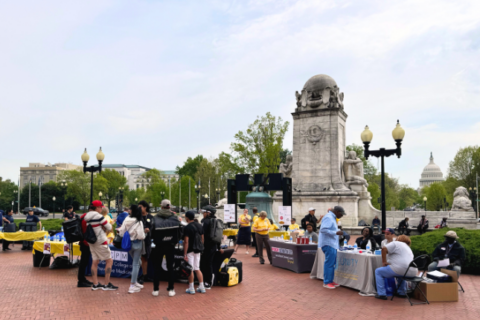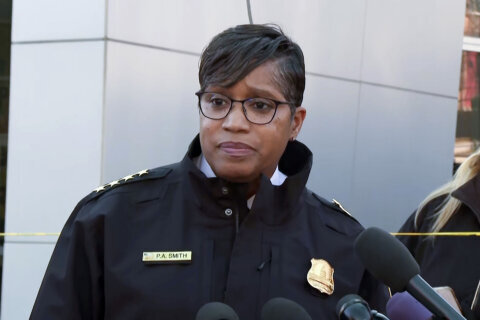Should the head of D.C.’s forensic lab be a scientist? And should he or she report directly to the D.C. Council rather than the mayor?
More than a year after the D.C. Department of Forensic Sciences lost its accreditation, shutting down its ability to conduct forensic casework on evidence collected from crime scenes across the city, the D.C. Council is debating legislation to overhaul the lab, including the qualifications of agency leadership.
The Restoring Trust and Credibility to Forensic Sciences Amendment Act, introduced earlier this month by Ward 6 D.C. Council member Charles Allen, would allow a nonscientist with significant management experience and a background in business or law to lead the troubled lab. It would also create a new mayor-appointed chief forensic sciences officer position at the lab as the agency’s No. 2.
The bill also aims to improve oversight of the lab by empowering an outside board of science experts to advise lab leadership to handle complaints of misconduct, negligence and testing errors.
Most of the witnesses who testified at a public hearing Thursday on the proposed legislation — including representatives from the U.S. Attorney’s Office, the Office of Attorney General and the Public Defender Service — largely agreed with the bill’s aims, but urged specific changes.
Debate also emerged about whether the lab, which would be renamed the Forensic Sciences and Public Health Laboratory and be reconstituted as an independent agency, should continue to report to the mayor or directly to the D.C. Council.
The bill already has the support of 10 members of the council.
“From a legislative perspective, as we look at what reforms are necessary, there is a really strong urgency to moving this forward,” Allen said, adding “the urgency is real.” He said he is still wrestling with many of the bill’s finer points, but said a vote on the measure would likely come by the fall.
‘I don’t think one hearing is enough’
The hearing on the bill comes after a tumultuous two years for the forensic agency.
A team of experts hired by federal prosecutors and the Office of the Attorney General to audit the lab in 2020 turned up evidence lab managers had concealed conflicting findings in an ongoing murder case from prosecutors and from the lab’s accrediting board.
Last year, the board pulled the lab’s accreditation to perform forensic casework; the agency director resigned, and another report, commissioned by D.C. Mayor Muriel Bowser, recommended reexamining every case involving fingerprints and firearms handled by the lab since its inception.
Deputy Mayor for Public Safety and Justice Chris Geldart, who largely declined to weigh in on the proposed bill’s specifics, said Thursday he believed there needed to be more hearings.
“I don’t think one hearing is enough,” he said. “I think we have to have much more conversation around where this is going to end up.”
Allen countered that the committee has held five public hearings on the failures at the forensic lab in the past year and a half, and that Thursday’s public hearing was the venue to discuss the proposed legislation.
“Everyone else has come with recommendations to say, ‘I like this part. I don’t like this part. Here’s a recommendation; here’s a possible amendment,” Allen said.
The deputy mayor said officials in the mayor’s office “have racked our brains and looked at this and come up with a different suggestions and alternatives.” But he did not discuss them during the hearing.
“There are some areas that, do we have a position? Yeah.” Geldart said. “Am I willing to say, ‘It has to be this?’ No, because we have too many stakeholders involved in this.”
Slow start to post-conviction review
Separately, Geldart told the council members that the post-conviction review of past cases involving fingerprints and firearms handled by the lab over the past 10 years has barely gotten off the ground.
Since the order launching the review was issued by Bowser in December, there have been only a few meetings between Geldart’s office, federal prosecutors and the Public Defender Service. The attorneys have negotiated how the review will be handled, and the District ultimately intends to hire an independent group to carry it out. But the next meeting hasn’t been scheduled yet — Geldart said summer is a difficult time to find to meet — and he said he didn’t believe the actual contract for conducting the review would go until the early fall.
He did not provide a cost estimate for the review.
Regarding the proposed legislative overhaul, Geldart said Bowser is “open” to the idea of making the crime lab an independent agency, but said the “pivotal question” to be answered is: “Who has oversight of this lab? Where will it report to?”
Report to the Council?
Jose Marrero, assistant chief of the criminal section at the Office of the Attorney General, said making the lab an independent entity — rather than a “subordinate agency,” as it is currently constituted — would shift the lab from being under the purview of the mayor to that of the D.C. Council.
“In essence, this means that the director of the laboratory would report to the Council rather than the mayor,” Marrero said, of the move. “The laboratory would be empowered to seek the funds it needs directly from the council.”
Marrero said systemic issues at the lab were long-standing and “were allowed to fester and compound for years,” and that when his office and prosecutors sought to raise concerns, they “were repeatedly dismissed and downplayed.”
He added, “It is imperative that the laboratory’s new director be able to assess and report on what they find in the laboratory and what will be required to fix it with candor. The only way to accomplish this is to allow the laboratory’s director to report to the council and to allow for removal of the director only for good cause.”
Face of the agency
The current legislation governing the lab requires the director to have an advanced science degree and a background in forensic science.
But Allen pointed to the lab’s past experiences in suggesting change might be needed.
“We have had, as the head of DFS, very capable scientists, but pretty bad managers — and that has directly led to the failings that we saw,” Allen said. “We saw somebody who was an absolutely capable scientist, but a bad manager who made bad decisions and compromised the integrity” of the lab.
The bill’s proposed changes would make the agency’s current interim director, Anthony Crispino, who has a law degree and experience in the management of other D.C. agencies, eligible to serve in the permanent position.
James Carroll, a firearms expert and assistant director of the Los Angeles County Sheriff’s Department’s crime lab who was one of the experts retained by prosecutors who first raised the alarm about problems at the lab, recommended that a scientist continue to be required to lead the lab, assisted by a chief of staff with management experience — perhaps in D.C. government.
“I do believe it’s best for a scientist to be the head of the laboratory, the face of the laboratory, because I think it’s important, at the end of the day, that you project that science — good science, reliable science — is the most important thing coming out of this laboratory.”
Marrero said he’s not aware of another crime lab run currently run by a nonscientist. “And I think that putting a lawyer or business person in the person who has experience in both of those areas, at the head of the lab may also potentially discourage talented scientists from applying to that lab,” he said.
Oversight board
Witnesses Thursday also debated the makeup of a nine-member panel of outside science experts who advise lab leadership, known as the Science Advisory Board.
The proposed legislation calls for renaming it the Science Advisory and Review Board, adding two members and putting the board in charge of investigating all complaints of errors and misconduct — cutting lab leadership out of the process completely.
“The impetus for this is well thought out. DFS failed entirely to execute this responsibility,” said Marrero, with the attorney general’s office. But he said the more robust review board could amount to outsourcing much of the lab’s quality assurance process to the volunteer, part-time panel of outside experts.
“While external oversight is critical, it cannot come at the expense of ensuring that there are effective leaders and a robust quality assurance program in the laboratory,” he said.
Instead, the board should maintain more of an oversight role, responsible for checking over how the lab responds internally to testing errors and other issues and — when significant concerns arise — stepping in and investigating.
“In the end, legislation can only do so much,” testified Carroll, a member of the prosecutors’ audit team. “It is essential that the right people be installed in the key leadership positions with the laboratory. A poor laboratory structure with solid people can be successful; an excellent laboratory structure with the wrong people can fail.”








